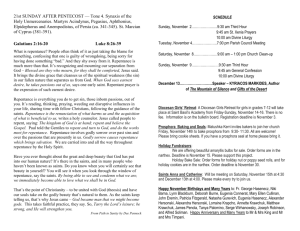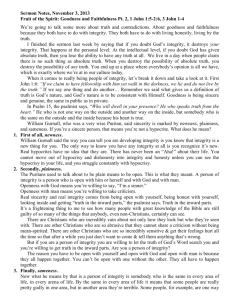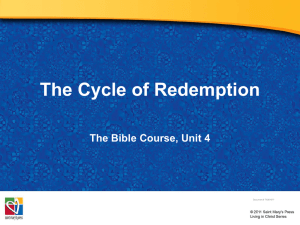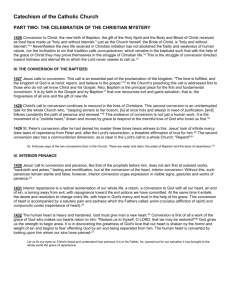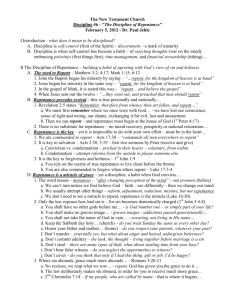Repentance is not
advertisement
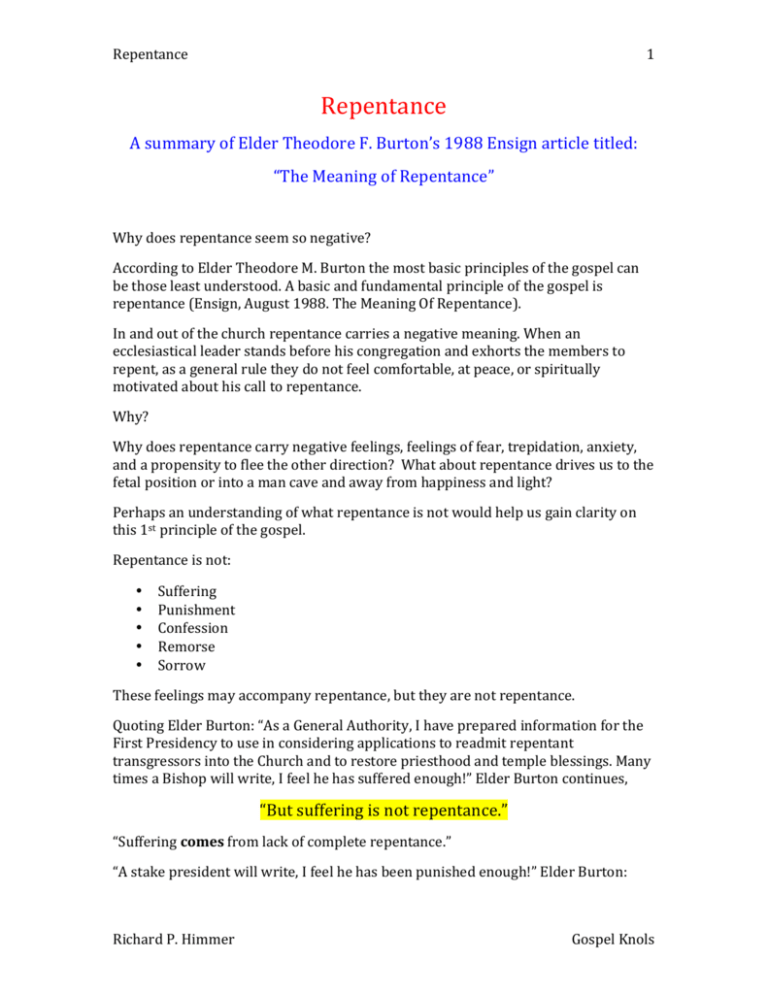
Repentance 1 Repentance A summary of Elder Theodore F. Burton’s 1988 Ensign article titled: “The Meaning of Repentance” Why does repentance seem so negative? According to Elder Theodore M. Burton the most basic principles of the gospel can be those least understood. A basic and fundamental principle of the gospel is repentance (Ensign, August 1988. The Meaning Of Repentance). In and out of the church repentance carries a negative meaning. When an ecclesiastical leader stands before his congregation and exhorts the members to repent, as a general rule they do not feel comfortable, at peace, or spiritually motivated about his call to repentance. Why? Why does repentance carry negative feelings, feelings of fear, trepidation, anxiety, and a propensity to flee the other direction? What about repentance drives us to the fetal position or into a man cave and away from happiness and light? Perhaps an understanding of what repentance is not would help us gain clarity on this 1st principle of the gospel. Repentance is not: • • • • • Suffering Punishment Confession Remorse Sorrow These feelings may accompany repentance, but they are not repentance. Quoting Elder Burton: “As a General Authority, I have prepared information for the First Presidency to use in considering applications to readmit repentant transgressors into the Church and to restore priesthood and temple blessings. Many times a Bishop will write, I feel he has suffered enough!” Elder Burton continues, “But suffering is not repentance.” “Suffering comes from lack of complete repentance.” “A stake president will write, I feel he has been punished enough!” Elder Burton: Richard P. Himmer Gospel Knols Repentance 2 “But punishment is not repentance.” “Punishment follows disobedience and precedes repentance.” A husband will write, “My wife has confessed everything!” “But confession is not repentance.” “Confession IS an admission of guilt that occurs as repentance begins.” A wife will write, “My husband is filled with remorse!” “But remorse is not repentance.” “Remorse and sorrow continue because a person has not yet fully repented.” Elder Burton then explains repentance by going to the Old Testament. The OT was written in Hebrew and the word for repentance is shube. The meaning of the word is ‘to turn away’ or ‘to change.’ We are commanded to preach repentance. If you consider the meaning of shube, then we are commanded to preach the concept of living differently, to turn away from sin or to change the way we live. When the Bishop exhorts us to repent, he is suggesting we change or turn away from harmful habits and turn unto the Lord. In the New Testament, the Greek word can be spelled multiple ways. One way is metaneoeo. Metaneoeo is a compound word; meta is the prefix and refers to change and neoeo means air, the mind, thought, thinking, or spirit. Therefore meta – change and neoeo – mind or thinking; metaneoeo – to change your thinking. This is an excellent synonym for shube. When the translators of the bible took the New Testament word metaneoeo from Greek into Latin they made the unfortunate choice of words to peonitere or penitent in English. “Thus the beauty of changing your thinking to a process than involved hurting, punishing, whipping, cutting, mutilating, disfiguring, starving, or even torturing is now associated with our concept of repentance.” (Burton, 1988) The meaning of repentance is not an endless process of pain, but rather a refreshing change of thinking. Repentance is doing things differently. It is thinking and acting in a different way or processing one’s habit with a different focus. The Old Testament prophet Ezekiel teaches a profound doctrine with respect to repentance. “If the wicked restore the pledge, give again that he had robbed, walk in the statutes of life, without committing iniquity; he shall surely live, he shall not die.” (Ezek. 33:15.) Richard P. Himmer Gospel Knols Repentance 3 Here we have three steps in repentance: 1. 2. 3. Restore the pledge Commit to change Forsake the sin Notice the phrase ‘restore the pledge.’ What pledge? Each makes pledges to our Father in heaven. Some have been made here on earth, baptism, confirmation, temple ordinances, and the sacrament. All of us made pledges before we were born. When we repent we change our thoughts, we renew our promises, and we covenant with God again. When we commit to change we do all within our power to eradicate the cause of sin and forge a new habit. We distance ourselves from the source of influence. Notice that punishment is not from the Lord, but rather from the sin. In other words, the Lord does not punish us for sins; He withholds blessings. The scriptures teach that the wicked are punished by the wicked. If you were to touch a hot stove after your mother warns you not to, you would be burned. Who did the punishing? The Lord? Your mother? Or you? The consequences of our actions are the sources of our punishments. In this case, you punished yourself. How do you forsake the sin? The Lord told Joseph Smith that “he who has repented of his sins, the same is forgiven and I remember them no more.” How do you know when your sins have been forgiven? “By this ye may know if a man repenteth of his sins—behold, he will confess them and forsake them.” (D&C 58:42-­‐43.) The surest way, for me, is when I hear the whisperings of the still small voice working within my mind and when I feel the spirit touching my heart. The Holy Ghost will not dwell in unholy places. When both are present, the Lord has confirmed my repentance through two witnesses and I know where I stand. If I have turned away from my sin, confessed it accordingly, committed to staying the course, and forsaken the sin by changing my habits and even associates, then the Holy Ghost will manifest my position through the heart and mind as found in scripture. (D&C 9:7-­‐9; 8:2-­‐3; 6:22-­‐23.) Richard P. Himmer Gospel Knols


